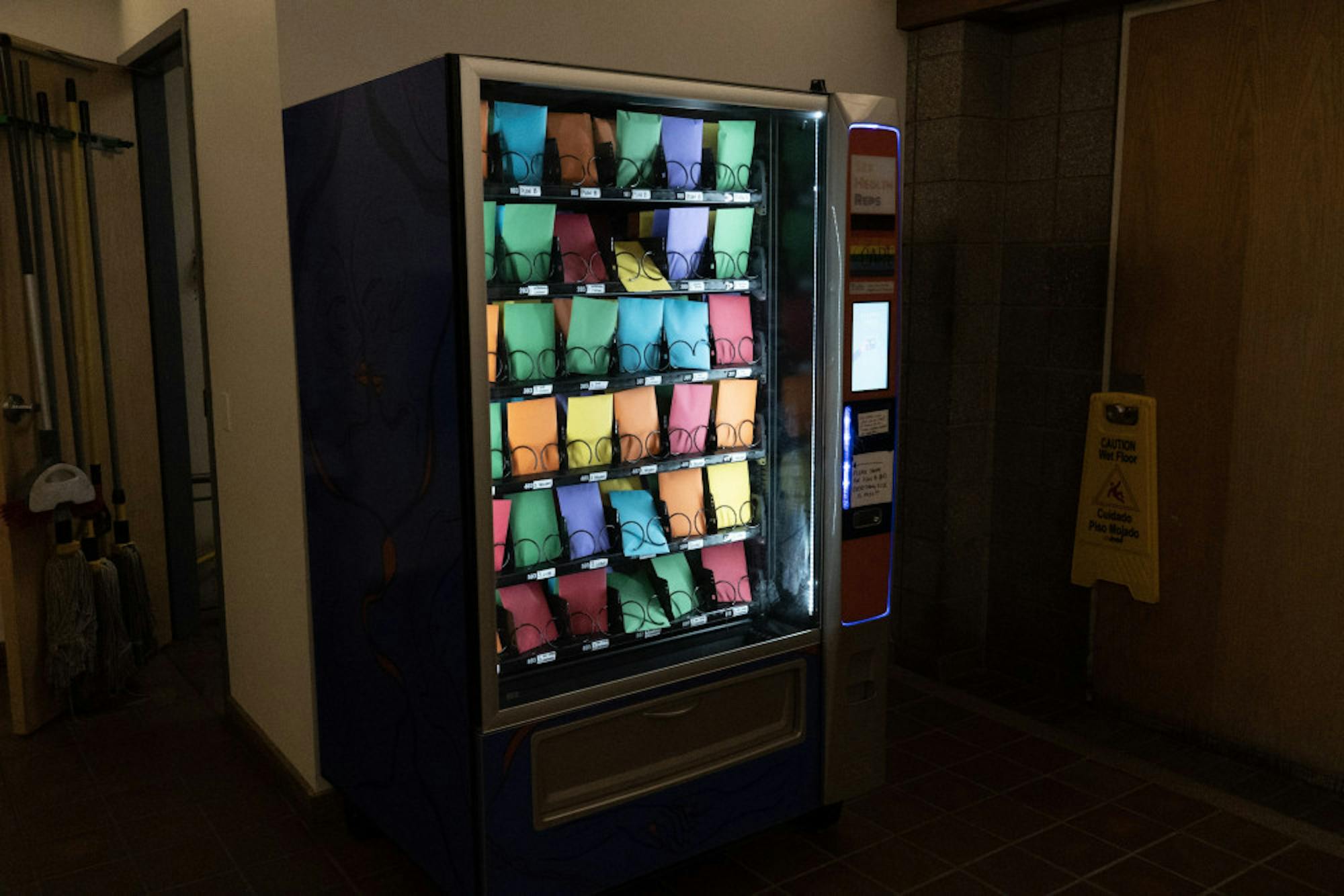Tufts’ sex health vending machine opened on Oct. 7. Located on the lower level of the Campus Center, the machine is fully stocked with free condoms, lubricant and dental dams, in addition to $15 Plan B.
The project was spearheaded by the Tufts’ Center for Awareness, Resources, and Education and Tufts Students for National Abortion Rights Action League to reduce the stigma surrounding sexual health and encourage safe sexual practices amongst students by making these products more accessible.
“The conceptualization of the machine was, ‘How do we make access easier for students?’” Sex Health Rep Paige Duff said. “If we can … help encourage [students] to use protection during sex, we want to do whatever we can to make that easier. The vending machine seemed like an easy and fun way to make that happen.”
CARE first proposed a free condoms machine as a result of the COVID-19 pandemic, when it became more difficult for students to access sex health products. While students used to be able to walk into Health Service at any time and grab free condoms, the pandemic forced Health Service to operate on an appointment-only basis, making this grab-and-go system impossible. Due to the pandemic, CARE also had to shut down its “Jumbo Condoms Circus” program, in which CARE would deliver free condoms to the residence halls of students who ordered them.
“Suddenly, we didn’t have spaces on our campus that were public [where] everyone could access the resources. By having a vending machine there, it’s all in one place,” Alexandra Donovan, director of CARE, said. “Everything you could want is there.”
Initially, the vending machine was only going to sell condoms, dental dams and lube. However, following advocacy from NARAL, Health Service ended up adding Plan B. At pharmacies, Plan B costs around $50; the vending machine sells Plan B for just $15. Duff hopes that the inclusion of Plan B will allow people to receive access to the resources they need without judgment.
“I think obviously there’s a stigma surrounding purchasing any sexual health products at all, but specifically people get really embarrassed having to buy Plan B,” Duff said. “There are people [who] wrongfully think that Plan B is the same thing as an abortion pill. …We don’t want someone’s fear of judgement standing in the way between them and the sexual resources that they need.”
Paige Shayne, co-leader of NARAL, explained that NARAL had been advocating for the creation of a Plan B vending machine since spring 2021. The current vending machine is a hybrid between NARAL’s vision and CARE’s request for a free condoms machine.
“On a basic level, [the vending machine] will make getting contraceptives a lot easier for students,” Shayne said. “I think having [Plan B] in a vending machine with things that not just women need is good because it promotes the idea that sexual health is not just for women. … Men should also understand what it means to take contraceptives.”
To ensure students’ privacy, the machine’s products are placed into unlabeled, colorful envelopes, each containing an information sheet about the item and its potential side effects. According to Donovan, the CARE team restocks these products regularly.
“Overall, the consumption of all the sex health supplies this year has been unprecendented compared to the last eight years beforehand,” Donovan said, referring to both the contents of the sex health machine and the bulk bags of condoms that CARE gives to RAs to give to students in residence halls.
“I’m in the Campus Center all the time and I see students walking up [to the vending machine] and buying things, which is really cool,” Shayne said.”I think students are super excited about it.”
Overall, Donovan hopes that the vending machine sets a precedent for the future. There is already talk of bringing the machine to Tufts’ other campuses, as well as more schools around the country.
“It is still somewhat of a novelty. I’m getting a lot of phone calls from other schools about ‘How did you set it up?’ and ‘What is it like?’” Donovan said.
Donovan also addressed potential barriers to using the sex health vending machine.
“We recognize that it might be a barrier for someone to come up and use the machine because of what’s in there and [because] it’s obvious that you’re using the machine, but at the same time, we want that to be just the norm,” Donovan said. “We celebrate people who are getting supplies that they need for what they need … so that this can be a normal conversation, and that asking for condoms to be used during sexual activity is just how it’s done.”
Going forward, Donovan encourages students to reach out to the CARE team with any suggestions they have for improving the machine.
“If there’s something else that you want, please let us know,” Donovan said. “We want to make sure that people have what they need, as well as if there are any concerns about the machine that we haven’t thought of. We are open to thinking it through.”






